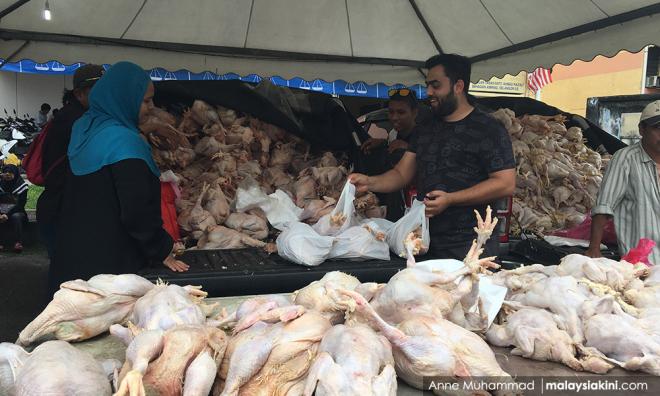
CORONAVIRUS | Although eggs are flying off the shelves, the chicken industry has taken a hit due to a drop in demand and the drop in the number of markets which are allowed to open during the movement control order (MCO) period.
According to former Federation of Livestock Farmers' Association of Malaysia (FLFAM) Chicken Unit director Yap Kim Hwah, Malaysia's 2,500 poultry farmers were caught off guard by the MCO.
"Previously, there was a huge demand at the construction sites, factories and schools. Now, they were closed down due to Covid-19.
"And the people bought only necessity goods and food at the supermarket and hypermarket. They wanted to save money," Yap told Malaysiakini.
While some farmers have resorted to slaughtering their own poultry, freezing the meat before selling online, many resorted to selling at a loss.
"There are people who sold as cheap as RM2 per kg when the cost of raising the chickens was approximately RM6," lamented Yap, who had been in the industry for four decades.
He said the entire industry lost millions of ringgit during the MCO period.
He called upon the government to help the farmers by encouraging the people to consume "cheap" chickens.
Yap said it is important to resolve unsold chickens as the farmers would reduce production in the coming months even during Ramadan.
FLFAM president Tan Chee Hee, who also rears chickens, said some of those in the industry had resorted to "panic selling" when the MCO started due to the limited amount of markets that remained open.
Unlike Yap, Tan believed that the demand remained the same.
Tan said FLFAM had proposed that the government subsidised the poultry industry and provide tax exemptions.
Importing livestock feed a problem
Meanwhile, Tan said the government had promised FLFAM to allow upstream industries to operate, including the importation of livestock feed and other products.
He said livestock farmers are running low on corn and soybean meal as these have to be imported.
"The local feed millers then blends these raw materials and supply to various livestock.
"But I am not sure if we are going to get the supply two months later," said Tan.
He was confident that countries like US, Argentina and Brazil would ensure the trade of these products to continue.
"If we cannot get the raw materials from these countries, there are always other choices," he said.
Tan said the depreciation against US dollar since the Covid-19 outbreak would translate to a five percent price hike of raw materials and the animal feed was approximately 60 percent of the livestock cost.
Concurring, a Malaysian Feedmillers' Association spokesperson said its members had enough of raw materials to produce the animal feed for two months.
"You see, it is a food-based supply. So, we cannot stockpile the ingredients for more than two months," said the spokesperson.
"The country need 6.5 million tonnes of raw material annually."
Despite the uncertainty about the next batch of feed cargo, he said they still have plenty of choice of exporters worldwide. - Mkini
No comments:
Post a Comment
Note: Only a member of this blog may post a comment.